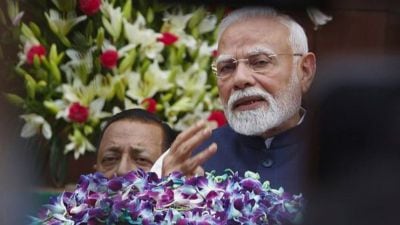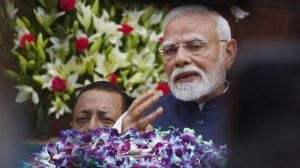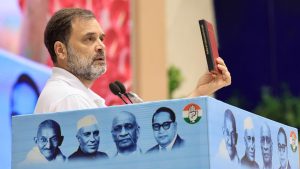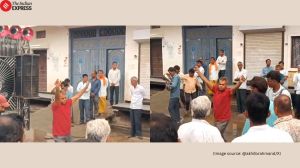Click here to follow Screen Digital on YouTube and stay updated with the latest from the world of cinema.
Madhuri Dixit’s Choli Ke Peeche, which shocked India and faced bans, is actually a celebration of female desire
Here's looking back at one of the most popular dance numbers of Madhuri Dixit that also turned out to be the most controversial song of her career -- it was banned on DD and AIR.
 On Madhuri Dixit's birthday, here's looking back at her performance in 'Choli Ke Peeche'.
On Madhuri Dixit's birthday, here's looking back at her performance in 'Choli Ke Peeche'. In the summer of 1993, when Subhash Ghai’s Khalnayak released its music and launched the first number ‘Choli Ke Peeche Kya Hai’, the moral police of the time was flabbergasted. The opening lyrics of the song were enough to make the conservatives uncomfortable. Such was the discomfort around the song that almost 32 organisations, political and otherwise, raised objections to the song even as the music album sold one crore cassettes in just one week, which was considered a record at the time. But as soon as the film released, all that mattered was Madhuri Dixit’s spellbinding performance to the Laxmikant-Pyarelal song, written by Anand Bakshi, choreographed by Saroj Khan and sung by Alka Yagnik and Ila Arun.
Madhuri is known as one of the best dancers that Hindi cinema has ever seen but in ‘Choli Ke Peeche’, she did something that went beyond her talent. The song has her character Ganga (the name associated with purity as per ancient Hindu mythology) singing about love and longing but also acknowledging female desire and explaining her idea of a perfect partner. Madhuri’s Ganga does all of this without being overtly sexual, but still being sexy. She does the dance steps, which probably many of her contemporaries could have also done, but the way she wraps the audience around her fingers with her expressions was something rare and a unique that Madhuri has. She seduces them with her innocence and goes from being naïve to flirtatious in matter of seconds. It’s almost impossible to look anywhere but at her face while she dances to some of the most controversial lyrics of the time.
Such was the controversy around the song at that one point Doordarshan and All India Radio banned it, which of course, led to multiple trips to the theatres for those who just couldn’t get enough of Madhuri in this song.
Lyric writer Anand Bakshi, in a 1993 chat with Mrityunjoy Kumar Jha, was asked about the ‘double meaning’ implied by his song and the veteran writer instantly denied the idea that the song was even remotely vulgar. “What’s vulgar about it? It’s a Rajasthani folk song. It’s played in weddings. Heart is in the choli only. If you are wearing a shirt, your heart will be inside the shirt. You listen to traditional Punjabi songs, if you start dissecting them in Hindi they might sound vulgar, but they are not.”
The wedding songs in Punjab are famously known for being heavy on sexual innuendos, and the same is true for many regional folk songs, but ‘Choli Ke Peeche’ did ruffle some feathers and that was possibly because here was a woman proudly claiming her sexual desires, and she wasn’t even some vamp who was doing it to distract the hero. It was the heroine named Ganga who was singing the suggestive lyrics to get the attention of the ‘khalnayak’ Ballu, played by Sanjay Dutt, who, in real life was behind bars at the time for his involvement in the 1993 Bombay bomb blasts case. Ganga wants him and makes it obvious that she does. There are no coy games, and no hints. And that’s probably what really shocked the conservatives.
The popularised idea that women aren’t assertive when it comes to matters of sex is thrown out the window with this song and the idea of women claiming that they want ‘it’ is probably what triggered the protests. 30 years later, and almost certainly, the song would have invited just as many protests if it was released today.
The song’s placement in the film makes perfect sense, and that’s how Ghai justified it at the time. “She’s a prostitute who is trying to seduce this villain,” he said in an archival interview. Logically, it makes sense but when has logic ever satisfied the protestors? Even Madhuri, in a 2014 interview with Amar Ujala, said, “There was a lot of hue and cry over Choli Ke Peeche. People protested a lot but when they watched the film, they went quiet. People loved the picturisation of the song and even those who had protested the song, they were applauding it.”
The protests against the song did not stop even after the film released. In fact, there were appeals against the film made in a Delhi court requesting the screening to be stopped on grounds for obscenity but the judges said that it did not offend public decency ‘in any manner’.
‘Choli Ke Peeche’ is an interesting case that is often recounted when any Hindi film song lands in hot water but not many songs since then, which found fame in infamy, and are still loved for their artistry.


Photos


- 01
- 02
- 03
- 04
- 05






























